
CLASSMATES °
Please contribute, particularly if amusing.
* February 2025 Get-together in Orange county. Jim Lewis and his
wife, Beth, traveled down from Carmel (after visiting Paul Kummer, north of SF, and Chuck and Becky), past the now-out fires of L.A., to Orange county and arranged,
first with Katie, then with Hardy to all have dinner together on the 4th. A great time was had by all -- and all classmates can listen in! Because
a substantial part of the conversation concerned the remarkable stuff Katie has already provided us and which can be found
here.
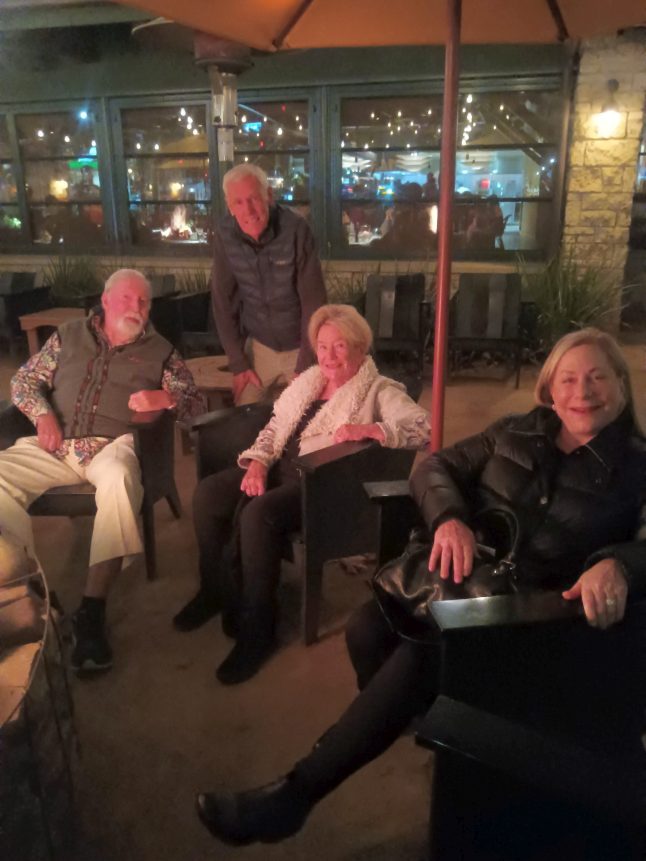
* February 2025 Sue Wallace writes: "found it interesting that Billy Williams lives in Glen Ellyn. When my husband Dick played in the Chicago Organization he went to spring training with the major league team. Billy Williams was in spring training at the same time, as were Ron Santo and Ernie Banks. One spring training someone put a snake in Billy's glove. He found it when he went to the outfield to play."
* June 2024 Dave Petersen
provides a link to an interview on YouTube with our classmate Bruce Nelson "who had a very distinguished career as a classical bass trombone
player. He also wrote the definitive book in the world on playing the trombone." Here is the
link.

* February 2024 More from Hollinger:
"The older I get, the more important are the memories from the Glenbard class of 1959. I live in Ocean, NJ with Louise, my wife of 44+ years. When Covid-19 hit, the
Eatontown Municipal band folded, and for a short time I stopped playing my cornet. About a year ago, I was invited to join the Band of Two Rivers,
composed of almost 40 volunteers who are still interested in playing. The band needed some officers so I decided to become secretary. We've
decided to revise our non-profit bylaws, so over the winter, we've done lots of research into NJ State laws, and modified the bylaws to allow
voting by email. Hopefully as we start our Spring season, the board, and members will approve of the work we've done.
Louise and I are both reasonably well and healthy, and have joined a Fitness for 55+ class that meets 3 days a week, She does pottery, once a
week.
By the way, my cornet is the one I started with in 4th grade. It's a Holton, built in 1914, so it is 110 years old. I've got slides to
change it from a B-flat instrument into a C instrument. When I was young, I could play along with my Mom and sisters , while they played the
piano. Later, when I was in The Chicago Youth Orchestra, I learned to transpose as I played. It's great mental exercise to play a note that
is different than the one in the music."
Dave adds: My hobby, besides band and cornet, is Microsoft Flight Simulator.
If anyone is interested in corresponding, I'd love to hear from you, HollingD@aol.com
* January 1, 2024 Becky has found this 22-yr-old photo of what she calls the "GHS Mergers". Terrific to see this.

Kellogg Bulleit Willard Fossum
Becky is also keen to share this poem with us: 50 Shades.
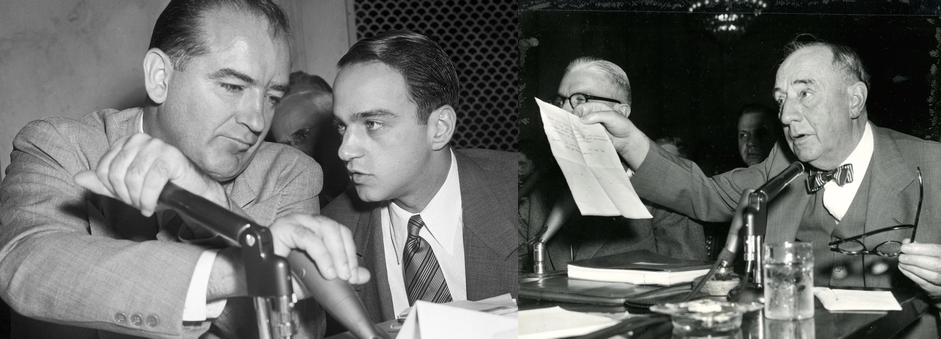
* March 14, 2023 [Pi Day]
Something caused one of us to think about finding Carol Mareneck. That something was a memory that Carol's mother taught us Lombardians social studies at LJHS. That course was
very important -- because Carol's mom and some other teachers set up a television in the gym and had us watch the Army-McCarthy hearings. It's likely that it was then that some of us
decided to become lawyers. We were all particularly impressed by Joseph Welch, in his three-piece suit and bow tie, who very eloquently represented the Army against McCarthy
and his assistant, Roy Cohn. For long, the memory was of Welch as the quintessential Blue Blood from Boston -- Harvard law, best law firm in Boston, Boston accent. Only
a couple of years ago did we find that he was actually from Iowa.
Please help find Carol.
Carol has now been found! Wendy sends her a handmade postcard every month at this address:
Carol Mareneck Vognsen
DuPage Care Center, Room 3138
400 North Country Farm Road
Wheaton, Illinois 60187
Wendy adds: "She cannot answer, as she has Parkinson's. But I am told by her caregivers that she enjoys getting and reading them."
* January 2023 Dave Hollinger writes: "I recently found my friend, Herb Wulff, after searching for 60 years. Herb left school early, joined the merchant marine
and became a captain of an ocean going freighter. He also participated in several sailing yacht races. He must have had some wonderful experiences. He has retired to
Penn Valley, CA.
Herb, my brother Tom, and I spent 4 weeks on the Illinois River, on a 21 ft. homebuilt boat (no kitchen, no toilet, no beds - just 1 bench, no appliances), by ourselves, when we were
12 & 13 years old --- with our parents permission and support.
Recently Herb told me that many years ago, he was in a bar in Penn Valley. A man sat nearby. They began to chat, It turned out the man was Mike Hoy. Herb remembered that Mike
said he had been in, or lived nearby, Sacramento CA."
[We've referred Dave to the entry by Tom Chandler about Mike that appears below here.]
* August 2022
After all these years Paul Kummer reports in, with a lot more than he provided in the Reunion book. Interesting
it is!
"I went to several universities picking up credits in various subjects, I couldn’t make a decision on a major. I went to school in Germany in 1965 for a year and graduated from Elmhurst College in 1967 with a BA in German. After graduating I went to Afghanistan in the Peace Corp in 1967. When I got back I went to Europe with a friend and got married in Switzerland. When we got back from Europe I traveled west looking for work in Forestry but instead landed a job as a piano tuner in Salt Lake City for Daynes Music in 1969. There was a recession then. I stayed in piano tuning for 40 years eventually going to San Francisco, where I married a second time and finally went to work for Stanford University as the piano tuner responsible for all their pianos and concert tuning. That lasted twenty years from 1986 to 2006.

Then I retired and lived in Gilroy for 8 years, and then Redding California where I am now with my son and grandchildren. From 2004 to about 2016 I took up painting. All my work can be found at
kumandala.com. [See also drawings.]
I haven’t played tennis since I graduated from Elmhurst college where I played on the tennis team. I became an avid camper.
I was in Jungian analysis for 39 years in San Francisco and am currently In therapy here in Redding.
Currently I’m reading “The untethered soul “ which I think says it all.
The photo of me was taken June 22 this year at the Fall River Tap House by a friend
[see our Gallery page]. I have some limiting health issues but am basically in good health. Gotta get out and walk.
Good health to you all!!"
* Xmas 2021 Here's Bruce's 1966 & Today message:
"Seven years after graduating from high school I was in Vietnam."
If any other classmates have war memories, please send.
* 8/1/2021 Well, this is 2011, but we've only just stumbled upon it.
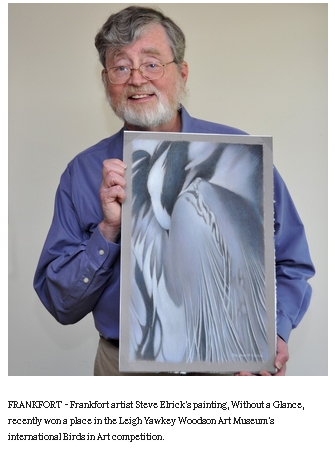
And it's here because Steve never writes us; we hope this will prompt him to do so. (If you are in contact, please pester him). More.
* 4/2/2021 Linda Mann writes from Clearwater, FL:
"Wanting to support our classmates’ businesses: We purchased Becky Bulleit’s family’s Bulleit Bourbon— Wonderfully delicious! If you haven’t tried it, do it. You won’t be disappointed.
Then we decided to try Jim Lewis’ Thompson Chocolates. Purchased it on Amazon. It was also delicious! Suggest you give it a try. Are there any more products we need to buy to support
our old friends? If so, please let us know." Hear, hear, Linda!
* 2/1/2021 One of us is in this wonderful, recently discovered 2nd grade photo. Who, and where in the photo?
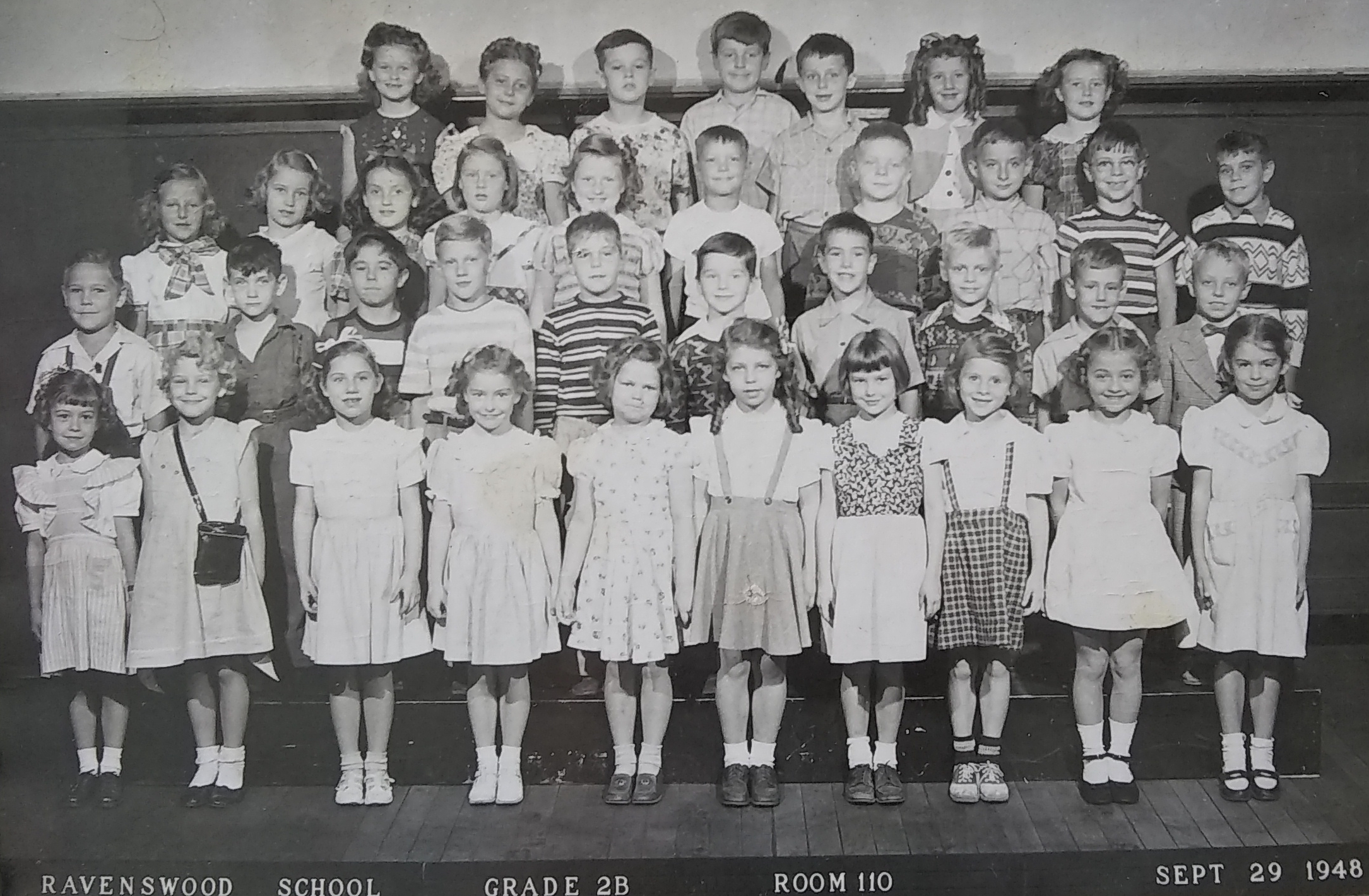
Please send us your 2nd grade class picture.
* 1/13/2021 The great turning into our 9th decade has already begun for some, and for Chuck, we now find, it
began on September 30. See Gallery
Happy Birthday out there in sunny California! Many happy returns of the day!
* 8/9/2020 Steve Capel. Actually, this is a memory of Steve about himself,
but it is an interesting one because it's about an event we all remember, the Mt. St. Helens eruption: "Our family went to the Pacific NW in July 1980, and that was just a few days after
she'“blew her top!'
You always drove with your lights on as the roads were volcanic-dust-covered and every car brought up a cloud. You had a coffee filter over the car’s air intake, and it was quite the
changed landscape from 1962 when I worked as a ranger at Mt. Rainier! EVERYTHING was grey-coated! Rainier’s snowy/glaciered top was grey too! Everything east to western
Montana was dull grey! And rains produced some quite turbid streams. Wheat farmers in eastern Washington were not really pleased to try harvesting with the ripe heads covered in
volcanic dust. It pretty much changed everything all summer in that countryside."
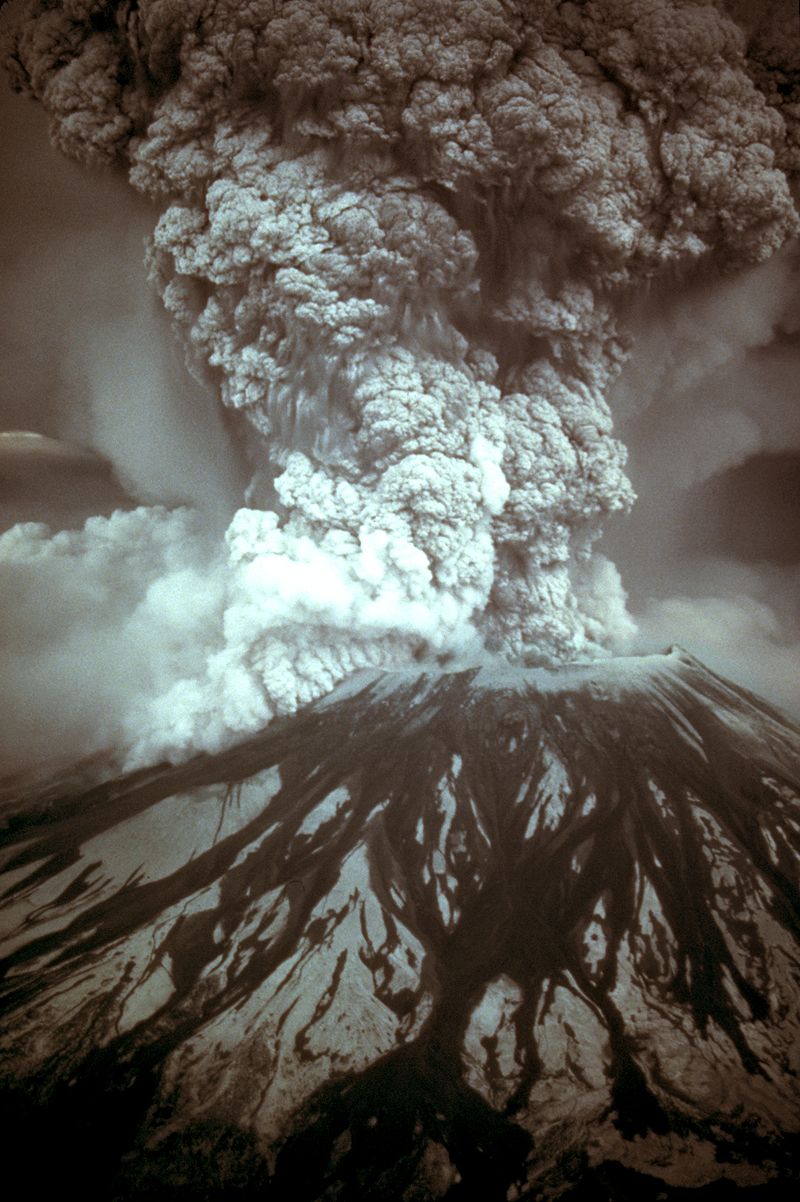
* 6/12/2020 Neal Whitecotton. 1944 -- the world is at war. D-Day, followed by the invasion of southern France.
Operation Market Garden, Battle of the Bulge,
Band of Brothers, Stalingrad,
Kursk.
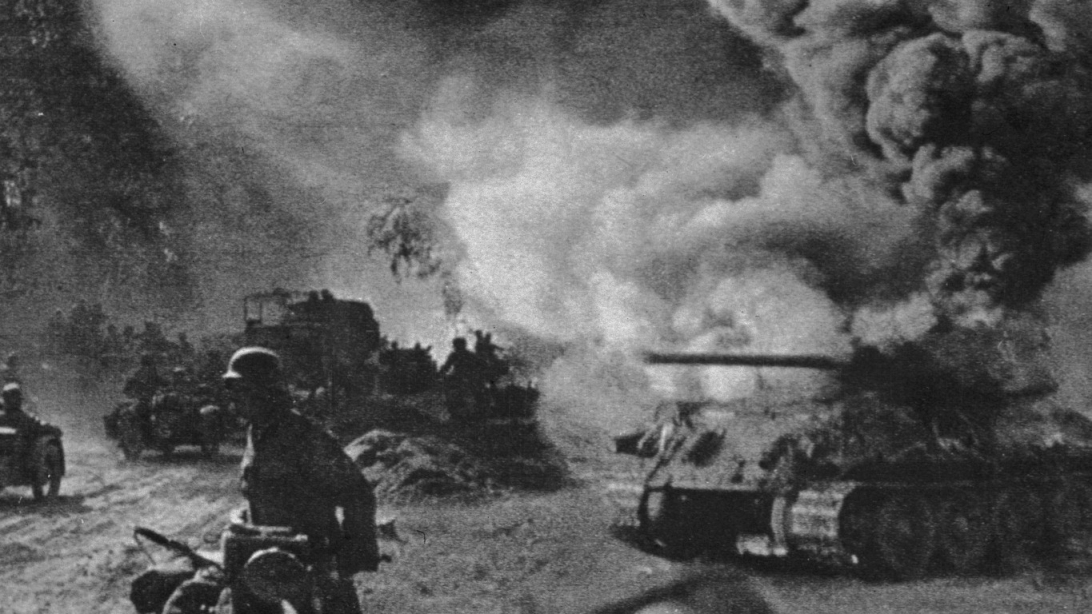
When will the World's trauma end?
Meanwhile, on placid Lake Ellyn, on a Sunday, a rowboat calmly makes its way across with one of our classmates held in his father's arms. Lucky us.
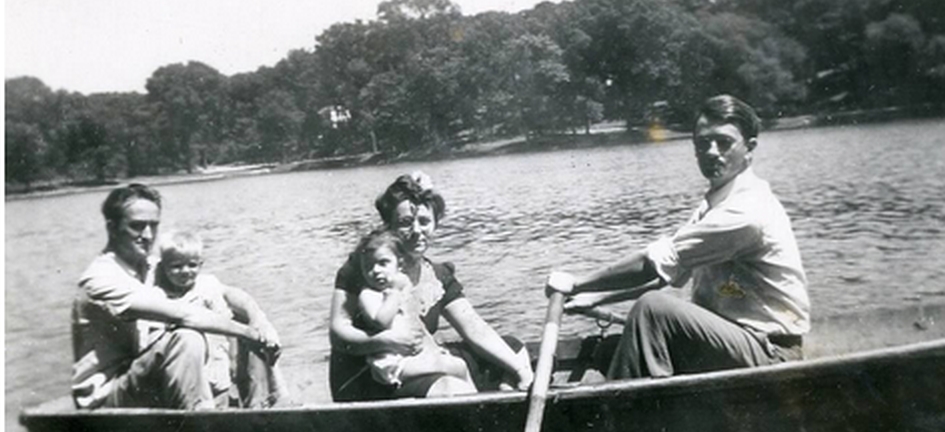
That's Neal's cousin Sharon in the arms of his aunt Imogene, and his uncle Paul doing the rowing. In just 15 years he would graduate from GHS. Looks like his dad, does he not?
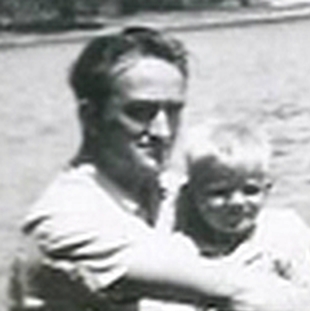
* 7/8/2019 Ariel Eaton. Karen Murphy shares the following: "Her mom was a friend of the hermit, who lived in
the fields across from their family home. The hermit used to bring her mom fresh wild asparagus and strawberries. Ariel and I used to rollerskate together to our grade school. One time
Ariel brought something like a caterpillar to share with her class when she tripped and fell just outside the school. The glass jar broke, of course, causing Ariel to bleed horrendously; I
think she may have cut an artery. It was my pleasure to discover that Ariel and her first husband were living in the Bay Area near my first husband and me! Years later, I visited Ariel at Mills
College while I was visiting in the area. Wearing a long white dress, she seemed to float across the main office to greet me. I have thought of Ariel so many times over the years."
* 1/11/2019 Barry Brynjolfsson lists only "Intramural basketball 1,2,3,4" and "Hi-Y 2,3" in the entry next
to his Pinnacle picture, so he may not be known to many of you. But Mike Menard and Hardy Wieting remember him well since they went to elementary school and Junior High with him,
and the three of them lived within a few blocks of each other in the area where Taylor comes down to, and goes up from Main.
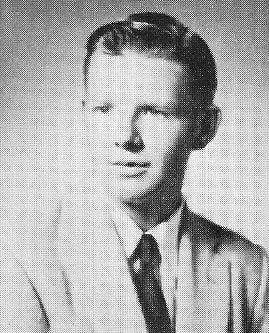
Barry's Glenbard activities and contacts were limited as he had to help support his mother and siblings due to his father's death in Barry's sophomore year. Upon graduation, he got a job as a teller in Lombard's bank. He was supporting a family of four, attending night classes at Elmhurst College when he could. He met a local businessman who was starting a new bank and who -- Barry being a very likable guy -- made him a bank officer on his 21st birthday, the earliest it could be done legally.
While in the AF Reserves, going through basic training, he got called into the Judge Advocate General's (JAG) office. The officer there was the fiancée of a college roommate of one of our classmates, whom Barry was then dating. For the rest of basic training, he was called into the JAG office daily, much to the consternation of his drill sergeant, and passed the time kibitzing with the officer.
His banking experience eventually landed him a job with the FDIC, the agency which protects us against the possibility of a second Great Depression. His job involved investigating bank fraud. "Most memorable for me," remembers Mike, "Barry was in Florida where the bank officers he was shutting down had made a $500,000 unsecured signature loan to a janitor in Virginia who, in gratitude, gave $450,000 back to the officers. Then there was a loan to a stripper who said she was making her payments in cash or services, depending on the mood of the officers."
The job also involved liquidating insolvent banks. His second wife, Lesley Wagner was a GHS grad, class of '64, a United stewardess he met flying back and forth from Chicago to Des Moines where he closed down a small-town bank. After 14 years, he left FDIC and the shenanigans, and worked in banks in northern Florida, where he fashioned a very successful career over the years. He became the president of a bank there, then bought his own bank in Apalachicola. He had a second home in Costa Rica and even acquired farms in Maine and Tennessee.
That farm half way between Nashville and Memphis begins the sad note on which this ends. He bought it to be near his younger brother who was dealing with prostate cancer. Their father had
died in his forties; Barry always felt a similar fate awaited him. Indeed, he had four different cancers over the years, but he beat them all till the last, making it to 2017.
* 4/27/2019 Jim Undem by Mary Hirsch: Jim and I had lockers next to each other for
our senior year. His best friend was Bill Bert (who died in a car accident years back; I have little knowledge of that). We became friends for the first time since I didn't go to grade school
with them. And then the years went by. In the past two or three, we started an email conversation which was enjoyable. There was no doubt that he had a happy family life and was
overall satisfied with the life that he had, in spite of physical difficulties later in life. * by Nancy Fricke: I have great memories of Jim in high school. He was so much fun. We reconnected
and exchanged some e-mails during one of the July Invitationals. We found out that we lived quite close to each other in Wilmette, IL years ago and never knew it. He will be remembered
as a fun loving, kind, and great friend!
* 2/13/2017 Wendy John by Mike Menard and Bruce Thatcher: Mike remembers: Jr High music teacher
"having Wendy sing Oh Holy Night at a Christmas concert that forever stayed in my memory, along with Barry Brynjolfsson's, as the best version we ever heard."
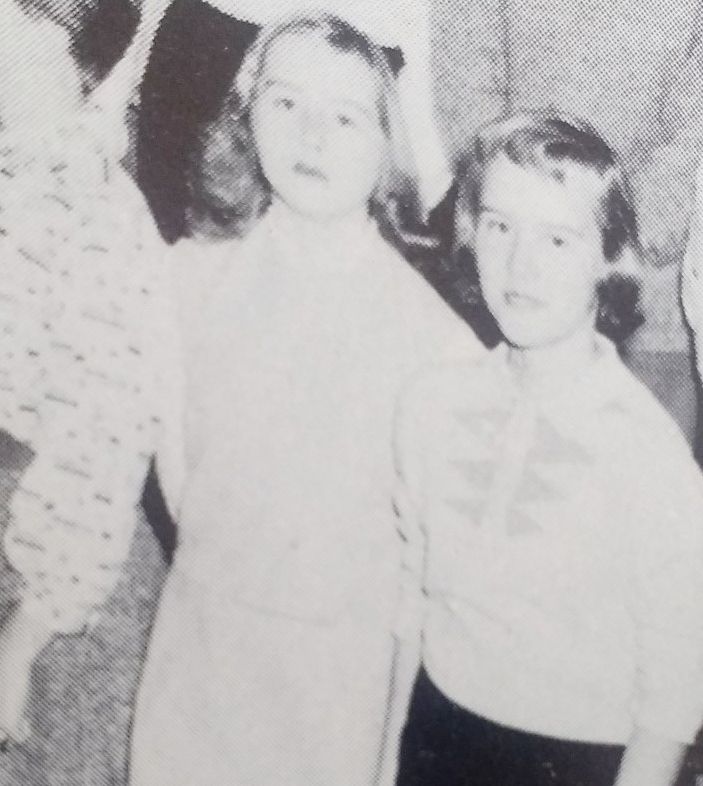
Bruce: "Most of all I remembered Wendy singing O Holy Night! 13 years after she sang that I was in Vietnam with the 1st Cav. Div., and I heard her singing when I was out on ambush
to when we were in the middle of a fire fight. Kind of funny. She became an anti -war activist, and she helped me get home. Thank you Wendy."
* 2/13/2017 Mike Hoy + Dick Cassidy by Tom Chandler: "I would like to join in on the remembrances as this has been a tough
week for me too as both Dick and Mike have a special place in my heart. Dick and I became good friends soon after I moved to Glen Ellyn from Long Island in 8th grade. In high school,
before we had cars or could drive, we walked to school. Jim Palczynski lived farthest out and picked Dick up (and Bill Hoff until he died of cancer), while Jim Lewis would stop by Teun’s
and we would meet up at my house on Forest, being the closest to Glenbard.
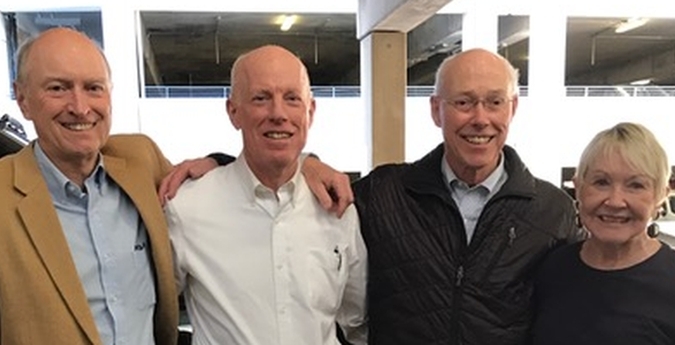
At memorial service for Dick in Dallas.
We used a two syllable yell so we would know how close the others were. I’m sure Jim, Teun and I could still do it if forced to. A bunch of us also spent a lot of time together in our
basement or driveway playing basketball year-round although we would have to use two broomsticks to stretch out the frozen net so the ball would go through. Our roots were deep.
~ With Mike living in Lombard, I didn’t get to know him as well but once we could drive, he was always included in our activities. His sense of humor was also always in evidence.
I remember once in our kitchen Mike had noticed a chalkboard that had a list of items my mother needed to pick up. Mike added “scrummage” to the bottom of the list which perplexed
my mother for quite a while wanting to know who requested it and how was it prepared. Another time, a bunch of us somehow found ourselves at a motel on Manheim as I recall after
some party or dance, and were enjoying some alcoholic beverages when we decided to throw Mike into the deep end of the pool. At the time, we didn’t know he couldn’t swim but we
soon learned as we saw him walking along the bottom until he reached the shallow end.
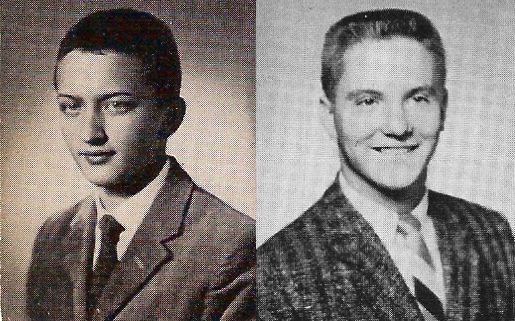
~ The Diamonds may have seemed to be a clique to many but it was a wonderful way to enjoy our friends and classmates senior year. It started the summer before senior year when I had a conversation with Gary Mutz and John Pond at Glen Oaks Country Club where they were member’s sons and I was a busboy….or was it the other way around? We wanted to find a way to more fully enjoy our senior year and I then recruited and organized 52 guys into the Diamonds where I was King, Mutz was Queen (we convinced him he was really the VP), Mike Campbell was Treasurer and we had ten classmates take the responsibility for setting up the activities for one of the ten months. Dick was the 2 of Diamonds and had responsibility for September. Mike Hoy and Ed Sheppard were the Jokers. We had a Diamonds “float” in the Homecoming parade, a Plymouth Fury that one of our guys arranged, and we sold peanuts for Kiwanis to try to divert criticism from our eroding reputation, and New Year’s Eve parties for the next three years.
~ But one enduring memory was the talent show senior year which had previously been dominated by talented girls singing and dancing (not to minimize others of you who may have added your own enviable talent). We wanted to spice it up a bit and somehow convinced those administrators vetting the acts to allow the senior guys to include three of our own. Teun, Ed Sheppard, Mutz and I did a pantomime to a bizarre record by the Chips called Rubber Biscuit. Others of us put on the wonderful version of Uncle Remus, with Mike Hoy as the Tar Baby. Then since Jim Miller would not allow a fraternity to be officially recognized by the school, the Diamonds became the Choir of the Rhombus for the talent show, and we sang a song popularized by Bob Hope called Sweet Violets (“There once was a farmer who took a young miss, in back of the barn where he gave her a . . . . Lecture on horses and chickens and eggs." Etc. lyrics) with Tim Jackson coming out and doing a few turns in a tutu during the chorus.
~ I’m not sure if the fourth 'act' was ever vetted or if we just decided to stick it in. I knew how to juggle three balls and decided it would be fun to spontaneously walk across the stage between acts when the emcee was talking. I recruited Mike to help and had him wear a trench coat and broad-brimmed hat and follow me in lockstep across the stage. As I remember it, the show was on two nights. The first night it worked perfectly starting from stage-right although no one knew what had just happened. There may have been a smattering of applause and laughs but confusion reigned. The next night I dropped a ball. I don’t know if we had a contingency plan but Mike ran after the ball, retrieved it and got in behind me and we started off again and went off the stage. I have smiled many many times at that memory in the almost 60 years since. I hope he did too.
~ I have attached six pictures of classmates from this period of our lives. [See our Gallery page here.] The first four were taken spring vacation senior year when a bunch of us drove 27 hours to Daytona Beach (how did we get our parents to let us do that?). Our group consisted of 12 guys in Mike Campbell’s Ford and our Mercury station wagon, and we took over a wing of the last motel on the beach. Some other guys were in town too (Dexter with another group, and others including Mary Hanson, Barb Fossum, Linda Kellogg et al). If you look closely, you can see Dick Cassidy in three of them (along with Bruce Spencer, Gary Mutz, John Pond, John Staedke, Jim Palczynski, Ted Heckler, Ed Sheppard, Kit Peterson, Mike Campbell, Hal Johnson, Mary and Barb). This trip produced many indelible memories but the one that comes first to mind for me involved Dick. Those of us who were single were all in the motel after dinner; Dick had written a letter he wanted to mail and asked to borrow the Merc. Off he went and five minutes later we heard what might have been a jet landing on the quiet highway outside our door. The accelerator had stuck to the floor and he was racing by when instead of turning off the engine, he put it into neutral which may have allowed him to stop the car but it sounded like he was approaching Mach 1 speed. When he then put it back into
drive, the transmission was all over street and there was a fire under the hood. Bruce Spencer was smart enough to run to the office and grab a fire extinguisher and put it out. That solved
the short term problem but left six of us stranded, causing our track guys to have to fly home for a Monday meet and our Student Body President to try to explain missing two days of school.
~ Another extraordinary event of the time was when I got the bright idea to go back to the east coast the summer before senior year. I talked to Dick about it, and he must have talked to Sandie Briggen about it, and we set up an itinerary to stay with my aunt in Forest Hills, NY (Queens, a subway ride away from the city), then to Cape Cod to stay with my grandmother, and finally to Rochester to stay with Sandie’s grandparents. I once asked my dad why he let me go on that trip and he said he figured if the Briggens didn’t care, why should he. Interestingly Dick had been dating Sandy so they had gotten to know him and trusted that their daughter was in good hands. Our big night out was to go to NYC and the Waldorf Astoria. We met a girl who had been a neighbor (5th grade girlfriend of mine and future wife of my brother Dick) whom we met at Penn Station and then headed to the Waldorf. We went up the elevator to the restaurant and got a table for four, surrounded by opulence. The entertainment was impressive, Xavier Cugot on the xylophone and the singer was Diahann Carroll (who is still alive at 81). We looked at the menu and decided we had to be a little more conservative than we had intended as we only had $20. We skipped dinner and each of us had a coke and we split a baked Alaska. Another trip with Dick to remember.
~ The other photos show some Miami of Ohio classmates who drove up to Dartmouth in Hanover NH to join me for the annual Winter Carnival, ferrying along Carol Sue Hesselgrave, the future Mrs. Chandler. I include these because Mike Hoy came too and is in two of the pictures. In one he is standing next to my cousin (from NYC), and is pictured with Carol Sue, Sherry, Becky and Ken. The other picture shows me and Ken with Mike in the passenger seat."
* 2/13/2017 Dick + Mike by Linnea Asplind: "I remember we met in the beginning of our freshman year when Dick, Phyllis Love and I were the only freshmen in Miss Schwartz’s upperclassmen Spanish class. She was a great teacher and the situation really made everyone stretch…and no one more than the three freshmen! Señorita Swartz (as she liked to be called) had a flair for the dramatic and one of the early assignments was to pair up with a classmate and rewrite a classic fairytale in Spanish and then act it out in front of the class. Dick and I were seated next to each other and we decided to pair up and translate Billy Goat’s Gruff. I made “costumes” and we prepared and practiced. I was not then (or now) a natural performer and the double fears of speaking in Spanish in front of a group and the terror of exposing my inner dork to the upperclassmen caused me much distress. However, Dick was in his element and seemed to enjoy the whole process as well as the end performance, and he eased my own qualms a bit. The thing that impressed me the most was how very comfortable he always was in his own skin and how skilled he was in helping those around him to be comfortable in theirs.
~ Mike Hoy was news I had not expected though I knew his health was poor these past years. I had tried to get him to stop in as we were not that far away and I thought he had a
daughter in San Diego whom he used to visit from time to time. He always put me off, and I realized he was either not traveling at all or was not up to the socialization. I will miss him too
and we shared so many good times together in junior high and high school. I will always remember his purchase of an old hearse (these vehicles come very cheap on the resale market,
I gather) and his habit of driving lots of friends around in it…often to work at Western Electric for summer employment. His humor and sense of the ridiculous were things I could bank on.
We had a lovely lunch once when he came to Seattle on Kemper business, and I had just moved there. He was just the same warm and funny person, and I was proud of him and the
many accomplishments he had made in his field. What a loss for us all."
Who are these?
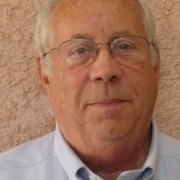
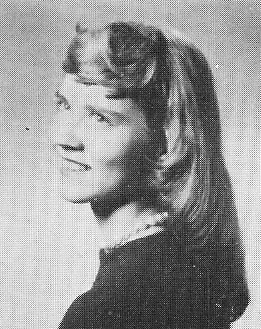
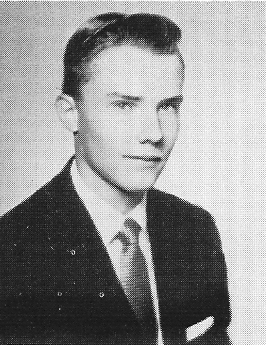
Answer is on our new Found page.
° CLASSMATES CONTINUED °

Image pixabay.com Our new Found page.
Questions about us: * Where did we eat lunch? * Did everyone bring a lunch from home?
* Aside from Don & Angies' where else did we dine? * Soda fountain?+ * Who smoked? * Who danced with Bobby Rivers?
* Who are the girls in math club photo (rt col)?
+Karen Isaacson: "at the old Walgreen's soda fountain I met [future husband] Al Dargatz."
Answers/questions: glenbard59@gmail.com
Precursor, recently discovered, to the discussion which follows: Diversity.
* 2/19/2018 the Doris Mitchell discussion. (Summary of the whole discussion thanks to Roger Griffith.)
"Indeed, this is an interesting and thought-provoking conversation. Thank you Margie for keeping us all in touch, and Cliff, and your wife, for following up with the research; I hope to read it this weekend. Like many in our class, I knew there were a few black kids at Glenbard but never became acquainted because we didn't have classes or extra-curricular activities together."
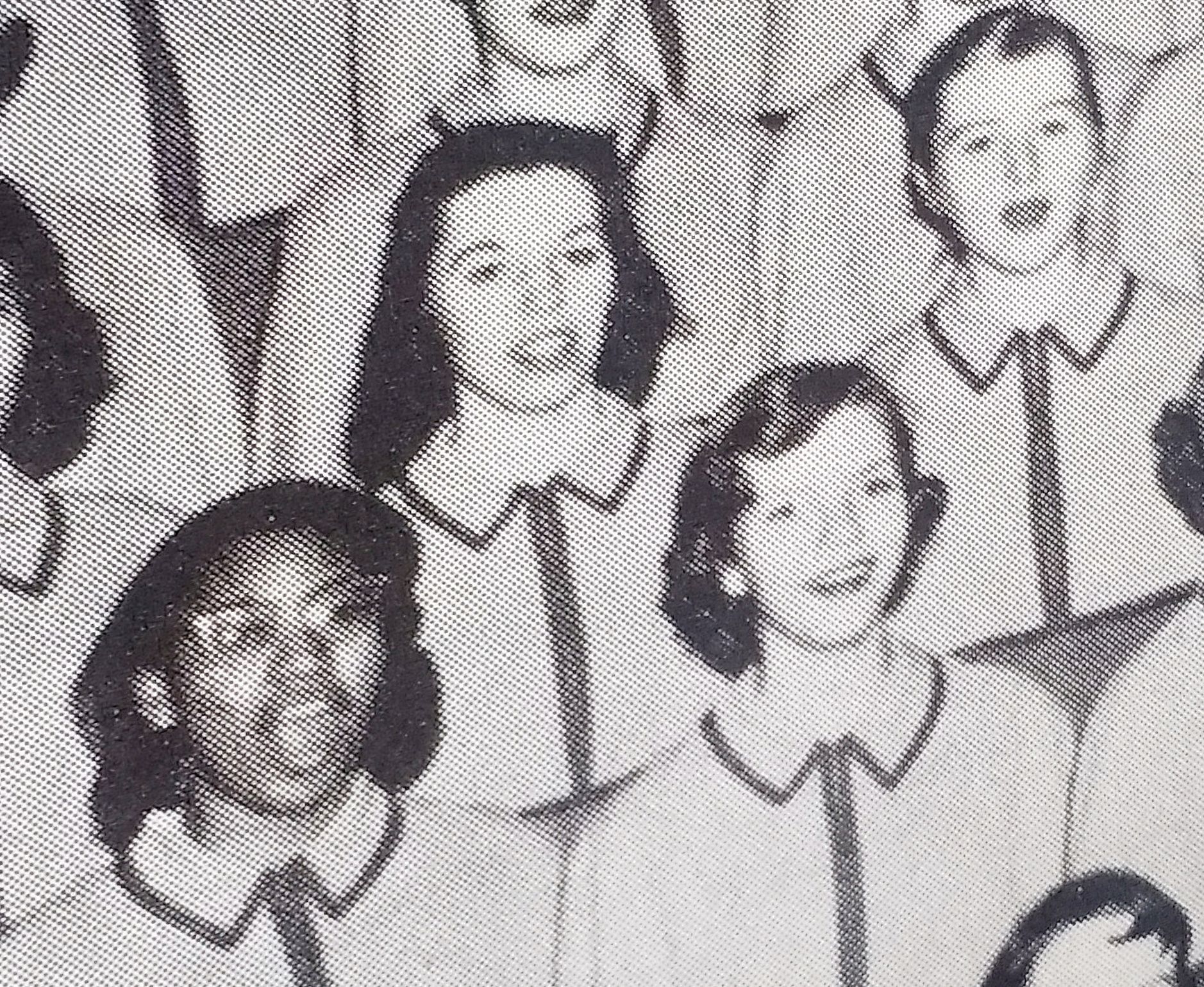
While I had never heard about "sundowner" laws anywhere, much less in Chicago suburbs such as Lombard or Glen Ellyn, I can confirm that Lombard's realtors had an informal agreement to discourage black families from buying homes in town because my mother, a social worker and like my father, a social liberal, was a member of a group that sought to stop that practice. As I recall, it came from a fear of lowering property values. My mother said York Center, just south of Lombard, like Oak Park, welcomed black families, and they did so apparently with no problems. About 10 years ago, I visited Lilacia Park, one of my favorite places in Lombard, during Lilac Time. An elementary school field trip was there. There were maybe 2 black children; several appeared to be Latino; and several Vietnamese or other southeast Asian. Times change!
Regarding your Greek father-in-law's experience, Cliff, and other examples of prejudice in times past that seems so odd to many people today, in 1970 an Italian acquaintance of a cousin of mine found she could not emigrate to Australia because she was not from northern Europe. Not too long after that, Vietnamese refugees sought asylum and other Asian people have settled there as well. I had a brush with discrmination myself when I worked in London for a year in 1965-66, needed a place to live and was taken aback to see "Europeans, only" in a notice posted about an otherwise good apartment; I looked elsewhere. As Cliff points out, there's a history off discrimination against Asians. Some of my older Japanese-American friends originally are from California and with their whole family, they were sent to the World War II internment camps, American citizens included. This did not happen to German or Italian people except for a few individuals who appeared suspicious. Hawaii did not suffer wholesale herding of its Japan-origin population into camps because, in part, they were important in the sugar and pineapple plantation labor force and also prominent Caucasian leaders in Hawaii spoke up for them as solid and patriotic citizens.
Hawaii prides itself on its diverse population, I have many friends from within this diversity and Hawaii is among the states and cities protesting Pres. Trump's blanket bans on people from a list of Muslim countries in court. However, when I arrived in the 1970s, I was dismayed to see that Caucasian children often got picked on in local public schools where they were a distinct minority, and this was part of what led to Hawaii having an unusually high percentage of children in private schools. Their students aren't primarily white, but the environment discourages fights more than the public schools in some neighborhoods. Most successful Caucasian politicians here have a non-Caucasian spouse.
* Janet Thebaud Gillmar
========================
Thanks, Hardy, for sharing these stories. "Troublemaker" indeed can cover quite a range of characteristics! Where did you find his memoir? [Was in law school with the woman he
later married, another Chicagoan, this one headed for New Trier, until her parents decided to move to L.A.]
For 5 years our daughter and her family enjoyed living in Chicago's "little sister" on Lake Michigan, Milwaukee. My husband and I also enjoyed our visits to them, especially frequent due
to their having a baby there and her husband having long work hours as a resident physician in the hospitals there, and some of the visits included stops in Chicago, I have enjoyed living
in Honolulu, my husband's home town, the past 40-odd years, the stunning beauty of the landscape and our many friends here, often Asian-American. But it was nice to get back in touch
with the seasons, the long public beach fronts in both cities, Morton Arboretum, and the friendliness of the northern Midwest. Hawaii calls it by the Hawaiian name, aloha.
* Janet Thebaud Gillmar
========================
Wonderful! * Kirkie 2/21/18
========================
Who would have thought that the death of a classmate’s brother would have triggered so many memories, and brought out so much history, especially about how things have changed regarding race relations over the years, and how they still have a ways to go.
Growing up in Glen Ellyn, every day at 6 PM the fire siren would sound. I was always of the understanding that it was simply a daily test of the siren.
I remember that another area where blacks were living, was where Hill Avenue entered Wheaton, before it crossed the tracks.
Hardy’s racial side story reminded me of a racial side story involving Bruce Spencer and I… Bruce Spencer and I attended Knox College in Galesburg Illinois.
In our freshman year we joined a fraternity by the name of ADE (Alpha Delta Epsilon). It was the only non-segregated fraternity on campus. It had been a national fraternity until 1954, when they accepted a black student. The national said they had to get rid of the black student, or leave the national.
They decided to keep the black student, leave the national, and form a new local fraternity, based on accepting a person based on their character, regardless of their race, creed, color, or religion. Our senior year, we even elected a black student as our fraternity president.
Doris…I apologize for not remembering or knowing you. If it’s any consolation, as best as I can recall, I think your passing has triggered more conversation, memories, etc., than the passing of most of our other classmates, and what memories there are of you, are all positive.
God’s Peace be with you Doris.
* Roger 2/21/18
========================
I have a friend, thanks to his being married to a law school classmate of mine, who (like his wife) grew up in Chicago and now lives in southern California. He was a prominent figure in the antiwar movement, and indeed appears in Ken Burns' recent documentary, having just a few years ago, written a memoir. He entitled it "Troublemaker" -- the idea being that he found far-left revolutionary rhetoric (and actions) ridiculous, he didn't want to be a revolutionary, but he did want to be a troublemaker. Bill Zimmerman's is a terrific read. (His wife is Joan Andersson).
Although the Vietnam War is at the center, it's also a book about Chicago -- indeed, the more I think about it, the more I realize it is a great book about Chicago, maybe the greatest. Not only does he describe growing up in our fair city, and attending U of C, but later in the book he is organizing the flights from Midway to ND and Wounded Knee to drop food in over the heads of the FBI. The team he put together was of ordinary citizens around the airport who knew how to fly; they were conservative, but they liked the idea of helping the embattled indians.
To go back even before that, though, he has emailed me something that bears on the Doris Mitchell discussion. I mentioned to him that Wendy and I used to go to the Oak Street beach and dine at Pizzeria Uno and Due. He, a Southsider who had been a lifeguard, replied with this story:
"I no longer remember if I included it in the book, but when the early sixties came and I grew my hair long, I was ordered to cut it by the lifeguard bureaucracy. When I refused, they transferred me [he'd been at the far northern beaches] to Oak St. Beach, without realizing it was where every lifeguard wanted to go because all the airline stewardesses staying in the nearby hotels hung out there. Lots of fun.
Then a black man made the mistake of trying to enjoy himself on that beach. The lifeguards told him he had to go. Being a sub-captain at that point, I overruled them. They called the cops who ejected the black man, over my loud protests.
Next day I was transferred again, this time to the 63rd St. beach on the south side. Blacks only, including the lifeguards. I loved it, and it was much more convenient to Hyde Park, which by then had become my new home. More fun."
* Hardy Wieting, Jr 2/21/18
========================
I agree with the comments that this discussion has been most interesting and illuminating. I also think it has been useful in reminding us how much times have changed since when we were growing up and in high school, and as some have said how in many cases we were sheltered from the realities of what was going on.
Like several others, I unfortunately do not remember Doris and only vaguely remember her brothers.
When we moved to Glen Ellyn in the 1950's, I recall my parents saying something about the realtors having an agreement among themselves to not sell homes to blacks and also that there were covenants in some property deeds prohibiting the sale to Negroes. However, I don't think I ever heard about a 6 p.m. curfew if Glen Ellyn even had one.
After reading the various posts in this thread, I mentioned them to my wife, the journalist and history researcher. She did some online checking and quickly found sites full of information on "sundown towns," not just in DuPage County or Illinois, but across the country. These were places that required blacks to leave at sundown, siren or not.
One author and expert on the topic, James Loewen has a very interesting site with detailed information town by town, county by county, state by state The link to the Illinois page is at
page while his home page is at home.
The U.S. Census data he provides shows that in 1960, Glen Ellyn had 61 blacks living there growing to 575 in 2000. Nothing is shown for Lombard in 1960, but in 1970 there were only 14 and by 2000 there were 363.
Click on the Naperville link to read some especially interesting background on that town.
I must say I was startled to read the extent to which sundown laws were in effect everywhere, and in some places may still be. Thus it is not at all surprising that Lombard and Glen Ellyn could have had such ordinances on their books.
African-Americans are not the only group to be discriminated against in housing and otherwise. Jewish people have faced this in some communities, possibly even in Glen Ellyn at one time. My father-in-law ,who had graduated from Georgetown and Yale, was told he could not buy a house in a subdivision in Washington D.C. in the early 1940's because he was born in Greece. The realtor told him flat out, "we don't sell to Greeks." My father-in-law subsequently bought just across the line in Maryland and was later appointed as a Federal Judge by President Eisenhower. Asians have been targeted as well, not only in housing, but just getting into the country. Does anyone remember from American History the Chinese Exclusion Act of 1882 which kept out Chinese immigrants until it was repealed in 1943. Of course there was the infamous Executive Order 9066 issued 76 years ago yesterday, which ordered Japanese Americans into internment camps. Now it is the Muslims.
Enough for tonight. Best personal regards to all.
* Cliff Argue 2/20/18
========================
Marjory, This conversation has certainly been interesting. The Mitchells sound like they were an outstanding family and I am sorry not have known more about them when I was at
Glenbard. I was aware of the “sunset” or “sundown” law in Lombard. I was told of it by my mother who had lived there all her life and thought the law to be ridiculous. I never associated
the six o’clock whistle with the idea that it might have had racial undertones. How blissfuly unaware and uninformed I was. However, I did have a recurring conundrum which may have
started in Mrs. Larson’s 7th grade social studies class when we did a full report on all the community’s departments, services and institutions. I could not reconcile the fact that there was
such a law in our town when the community was so proud of the Peck House (on Grace and Parkside) which was an important part of the Underground Railroad! I do wonder when the
sundown law came to be passed and I wonder if it was ever enforced…..I never heard that it was and I like to think it wasn’t, but who knows.
* Linnea Riley 2/20/18
[PS from Margie: Peck House now a museum, very worth visiting.]
========================
In many respects, we have moved on -- but as someone said, the price of freedom is eternal vigilance. Here in Canada, we have our own dreadful stories around indigenous populatons out west and up north, despite apparent (and welcome ) diversity in most of our towns and cities.
We can't change the past, but we can work for a better today and tomorrow. What an interesting discussion this has been! Cheers,
* Sheila Clarke 2/20/18
========================
This seems to be a touchy subject with some, and we must remember that we have had hugely different experiences since 1959. I, for one, am glad that the world has made some changes, but maybe not enough or maybe ones that I don't like. We are fortunate to be able to look back and to learn about the way it was then and the way it is now.
Whatever we discuss, let's not go into the more awful prejudice in G.E about religion, which went back to who could obtain what land for their church and how high the land's elevation
was. . . Sigh . . .
* Mary Hanson 2/20/18
========================
Regarding Chuck's experiences, I am a former RE broker, albeit dealing in commercial properties. A FSBO transaction would not have triggered anything as the title company would have noted it in their title report for the mortgage company. If the buyers were non black, it would not be an issue. But in all probability, it would have been ignored in the 1960's and later by both the title company and the lender since it was illegal. That is what I was told by my local title companies.
* Mike Menard
========================
This has been so interesting. Hardy, did you have any idea your posting would lead to this interesting discussion?
If Glen Ellyn would have had the same 6:00 pm ordinance how would Doris and Rod have been able to come to any night activities at Glenbard? I looked William up in the 1958 yearbook and then remembered him. It said he was in choir his junior year so the whole family sang I guess.
We live in an community with maybe 2 black families but one third Asian (mainly Korean). Angela Bassett and her husband who played Johnny Cochran in the OJ Simpson TV movie (can’t think of his name right now) live here. I think blacks would be accepted but they would have to be professionals because of the cost of housing.
Can someone find out what the laws were in Glen Ellyn in the 50’s?
* Becky
========================
Bias was and is alive and located across the states and the world. What we knew then was informed by our own, our parents and friends experiences. I am sorry I was so clueless then. College and business life helped me later.
* Bob Stoothoff
========================
Let me tell you a not so long ago story- Somewhere in our family there was an uncle, a lovely man, deeply involved in nature and conservation. At one time, he became a realtor in a very conservative suburb of Illinois to the SW. He arranged a sale, and then discovered the professional family from Chicago with whom he was negotiating, were black. He suddenly found that the house was no longer available. The couple sued, and there was a settlement arranged by the uncle's company- but the couple either did not get the house or chose not to take it. I don't know the details, but I know that my uncle became office manager, was considered a local hero, but was no longer on the front sales line. There were no regulations, there were no laws to preclude other races from living in the suburb. There was strong - what, will? tradition? bigotry? all of the above, probably. When the uncle died, the town hall flag few at half mast. I looked up the demographics of that suburb just now- It is still well over 95% white. -not a story I enjoy telling, btw.
* Sheila Clarke (aka Sande Rockwell) 2/20/18
========================
. . . Remember the "Six o'clock whistle" in Lombard? My mother told me years later that it's purpose was to alert the blacks to leave. And I thought that it meant that it was time to come in from playing with the neighborhood kids and eat dinner.
* Margie
========================
I know of a family and I don’t know for sure it was Mitchell —that lived on Carlton just north of Duane. They were black and had a daughter who was a great singer and supposedly went in to the Lyric Opera company. They lived completely within the village. I see Doris and her brother “B.” Mitchell as juniors in Mr. Hutt homeroom.
You know my family has been long time residents of Glen Ellyn, my parents had businesses in town, and I never ever heard that blacks were forbidden places or controlled by curfews in village or Lombard.
* Marybert
========================
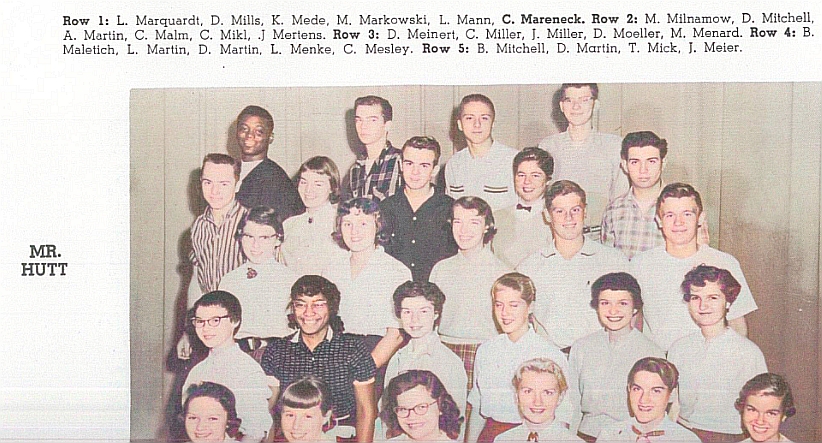 ========================
========================
All very interesting. My parents purchased our Glen Ellyn home from the owner. No realtor. There were many homes for sale by owners in Glen Ellyn in 1955.
Becky and I purchased a home in Mount Prospect in 1966 via a realtor and sold it in 1967 by owner. Nothing in those sale agreements about any restrictions regarding blacks. My parents
never talked about racism issues.
* Chuck 2/20/18
========================
Yes, Jan, I remember this, too. In junior high we all were assigned to do a paper about some aspect of Lombard history. I don't recall who it was who uncovered this ordinance, but it was still in force in 1955, and stated that blacks had to be out of town by 6:00 p.m. I don't recall ever hearing about any such restrictions in Glen Ellyn or other surrounding towns and I never knew exactly where the Mitchell family lived. I do know that when this came up in 1955 all of us were pretty much dismayed but had no idea why no one had ever changed the law.
* Jill Hollifield
========================
There was an ordinance in Lombard that blacks had to leave town by 6:00 pm since the cleaning people and workmen were the only blacks there during the day.
Blacks were not allowed to own property or rent which is why the blacks in Glenbard did not live within the city limits. I remember my parents telling me about this when we were in high school.
We think of discrimination as being in the South; but the suburbs were where the whites moved to separate themselves from the blacks in the cities in the North.
* Janet Kelley Halvorsen
========================
I had also heard that Blacks were not allowed in Glen Ellyn but this was for after dark. This is many years ago.
* Linda Pond
========================
I read in a history book of Lombard that there was a village ordinance not allowing blacks that was revoked in 1969. I have no idea if it was enforced. Here in ultra liberal Madison,
Wisconsin, a large subdivision development in the 1920’s had a deed restriction against "Ethiopians" not to mention corn (!). I want to mention something here that is only generally
related, but is interesting. Barry Brynjolfsson -- His proudest accomplishment was when he bought the bank he worked in and saw several hardworking employees
(mostly women) working at tasks far above their job titles. His first promoted employee was a black women with 15 years on the job. He called her into his office, and like most people,
she feared for her job under the new boss. Instead, he told her she was doing a good job, and she was now a bank officer. She bawled, as you can imagine, a black woman in a small
southern town, getting a prestigious job.
* Mike Menard
========================
Mary: Your statement that “ blacks were not allowed in Glen Ellyn ” is NONSENSE!
* Chuck Gelhaar 2/20/18
=========================
Doris sang "Embraceable You" in one of our shows, maybe not the talent show. She had on a gorgeous dress, and her song surprised and melted the audience. Her family had to live outside of the village limits because--and this is hard to say--blacks were not allowed in Glen Ellyn. Both of them came to school impeccably dressed and never seemed to approach "us" or to look for any acceptance. I was told that her parents collected our garbage, which may or not be true. If it is, they probably did quite well.
That's a difficult one to remember, isn't it? Love to all of you,
* Mary Hanson 2/19/18
=========================
I felt sorry for Doris not only for her being the only black girl in HS at the time but she also had to deal with her strict church background in that she was not allowed to participate in our
social dance class in gym (her choice). I cringe at the memory of being next to her brother in a washroom and being startled to see him wash his hands and have his palms be white, as if
he scrubbed his skin color off! Yipes, my ignorance was appalling.
* Mike Menard 2/19/18
=========================
I first met Doris when I moved to Glen Ellyn in 8th grade. We went to Wagner Grade School on Park Blvd, just south of Roosevelt. Sorry to hear of her passing.
* Betty Rawaillot Miller 2/19/18
========================
I don’t remember Doris, but I do remember her brother Rod. At the time, I thought he was the only African-American at Glenbard.
* Roger 2/19/18
=========================
I believe the Mitchells lived on the north side of Geneva Road at the end of Pleasant. That was outside the "city limits" at that time. I also remember her brother singing and sounding like Johnny Mathis.
* Judy Smith Noren
=========================
I remember Rod singing just like Johnny Mathis!! I always felt a little sorry for Doris because Rod got so much attention and I think she was shy. Times were so different then for an only black girl in a white school. Does anyone know what happened to Rod? It lists him living in Los Angeles. I wonder if he got into the entertainment field. Ed sure accomplished a lot.
* Becky
=========================
I remember Rod singing "Misty" at the Heart Hop dance. I always remembered that when I would hear “Misty".
* Mary Lou Grant
=========================
Sure do! I often thought how difficult it must be for their entire family because as I recall, they were the only black family in the entire school.
* Jillayne Hollifield
=========================
* Mike Menard also remembers Doris’s younger brother singing in the talent show.
=========================
I am as clueless. Of course it was a big class.
* Bob Stoothoff
==========================
We had an African-American girl in our class?? I am totally blank on that. I looked up her photo in the 1959 yearbook, and that didn't help. According to the yearbook, she sang in the choir the same years I did. Could I have not noticed her race? I looked up her obituary which tells nothing of her life and uses her high school senior photo. Please tell me there is someone out there as oblivious as I.
Margie, my computer won't send to a long list as yours can. Please pose the question for me. I'm embarrassed to be so ignorant but curious to see if there is anyone else like me.
* Jan Whittaker Rink
==========================
I remember Doris and her brother Rod. I was going to say, too, that I remember he had a beautiful singing voice. Was he in the class behind us? I can’t put my hands on my yearbooks right now.
* Ann Ryan Waidelich
=========================
Margie, Doris was quite a girl. One of the nicest. When my brother student taught in choir at Glenbard (our junior year, I think), Doris told me that she "digs Mr. W the most" -- my lily white ears were both shocked and pleased. (easily shocked, I know)
I remember Rod, her younger brother in a white suit singing Johnny Mathis song ("Chances Are"?) at talent show.
* Neal Whitecotton
==========================
Sent: Monday, February 19, 2018 12:19 PM
Hardy remarked when sending the obit of Doris’s older brother that, “ He was quite a guy!" I don't doubt that Willie was too and that Doris was quite a woman.
Joe Petter added the following. "Margie, Doris Mitchell’s other older brother, Willie (William) Mitchell was Class of 1958, and, according to the obit, he also passed
away some time ago."
* Margie * Joe Petter
========================
From: Margie Stoll Sent: Sunday, February 18, 2018 6:50 PM Subject: Our classmate Doris Mitchell.
Hardy found the following 2013 obit for Doris Mitchell's older brother, Edgar. It mentions that Doris preceded her brother in death. Although we do not have an obit for
Doris, I've included her brother's. It’s worth reading.
Edgar
[Postscript:] we have now found Doris's: Doris
========================
Geneology note (from Edgar's obit):
Parents of Doris:
Elliott Dupree Mitchell and Zenobia Odom Mitchell.
Brothers of Doris:
Edgar (born 1932); Elliott; William, and Rodney.
Sisters of Doris:
Harriet and Barbara.
° MEMORIES OF FACULTY
Posted periodically. Please send.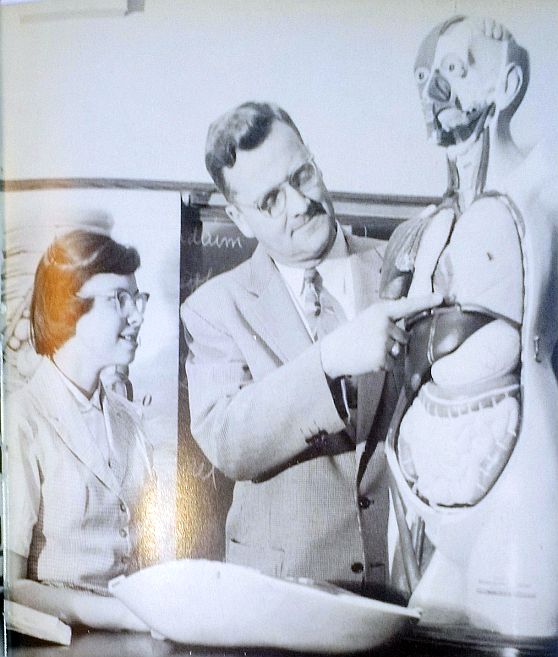
CAR Johnson taught biology. He was very proud of his signature. He had three first initials rather than the more common two, and he drew his signature
artistically, large and in elegant script. This artistic bent carried over into his biology classroom. We were assigned not merely to study various critters, but to draw them -- draw
them very accurately, each part carefully labeled -- as well. Some of us still have our drawings of a lobster, various plant parts, a grasshopper, etc. Some of us wondered whether
we were more interested in the art than in the biology. PS. Roger Griffith remembers CARJ as the cross-coutry coach who once said that a guy with his girlfriend was "walking the dog." [!]

* * * In honor of CARJ we now have a drawings page. Click here. Send in any old drawings you have, of any type at all. * * *
----------------------------
Delpha Patterson taught Latin. A delightful, kind, bit eccentric, intelligent woman whom we all presumed was a spinster totally devoted to her subject.
She possibly deserved better students than were we, but then GHS was not a classics-oriented prep school. We always presumed she dyed her hair to keep it black.
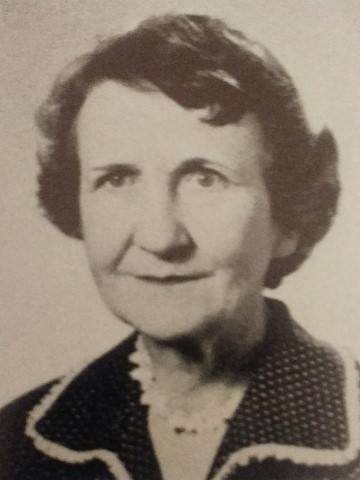
To stimulate our desire to learn Latin Ms. Patterson decided to have us look for references to Ancient Rome in current newspapers and magazines. That would demonstrate
that although we were dealing with a language from two thousand years ago, the culture from which it came was still relevant. We were to cut anything we found
out and paste it in a workbook which we would then hand in. It was amazing how much we found. Many references to Julius Caesar; gladiators were popular, as was Nero
with his fiddle; would America's empire fall? New Yorker cartoons were a rich source of material.
Here is Delpha at Monmouth College: 1921
-------------------------------
Ralph Magor taught geometry (plane and solid). Most of us can remember sitting in his class in what was likely our sophmore year trying to absorb his
lecture on the Pythagorean Theorem while the school band was outside on the football field practicing its rendtion of 'Rock Around the Clock'.
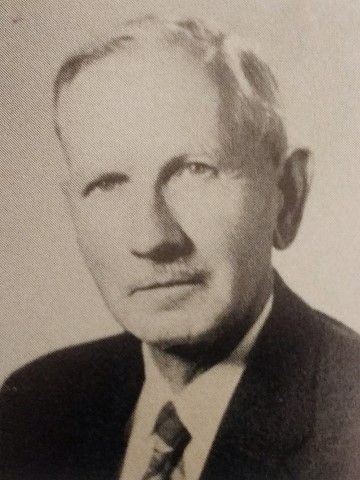
Magor was also the varsity men's tennis coach.
One day after school, one of us remembers walking along the sidewalk at the base of our hill there, where cars are parked diagonally facing the hill, and noticing his
car. Also noticed: he was in the driver's seat, but slumped over onto the passenger seat, and he wasn't moving. Had he had a heart attack and should we run
for help? He was, after all, in his senior years. Or was he just sleeping? He wasn't moving.
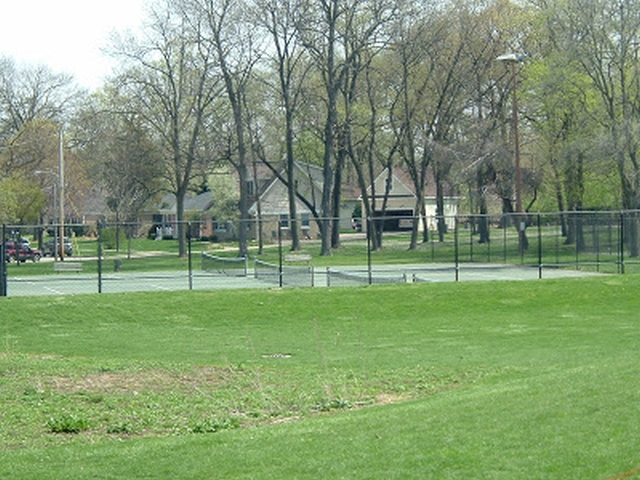 -------------------------------
-------------------------------
Clara Diers taught world history. The reading was arduous, but on the other hand it was of course interesting to learn about the world -- which meant
in those days, Europe and not anything about Asia that was memorable.
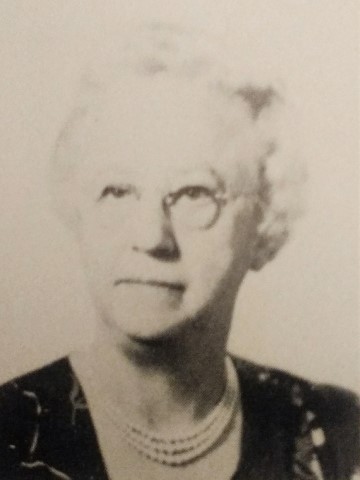
Ms. Diers was a bear on the Balkans. We all came away versed in the tortured history of Bosnia, Herzegovina and Montenegro.
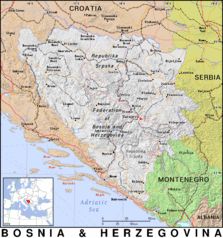
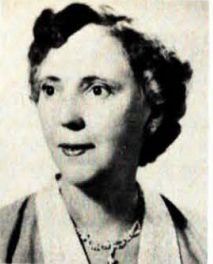
Roger Griffith remembers that language teacher Ivy Britton Bartosik (and her photo makes her look like an actress playing the part of a high school teacher) put a wastebasket over her head whenever she got frustrated.
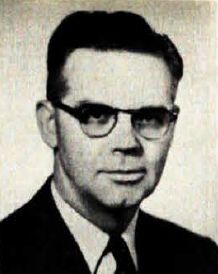
Roger also remembers science teacher Clyde DeWalt's "voice, his surprise noise, smoke & stink bombs; tricks we played with his hearing aid."
--------------------------------
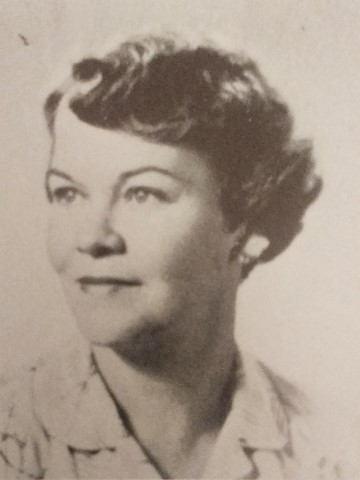
Eleanor Dowling, English teacher. An intelligent, thoughtful woman very much like Ms. Sinden in some ways. She taught the advanced classes
for students beyond the first year.
--------------------------------
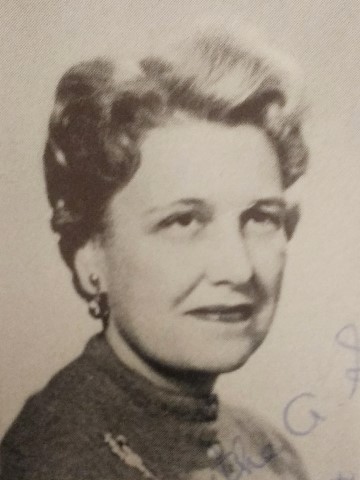
Ms. Sinden taught American history. One of our classmates says, "The thing I remember about her is the comment she made during our
Washington D.C. trip. It was in April, 1959, the day that the newly in power Fidel Castro spoke to the U.S. Congress. It just so happened that on
that day and at that time, my group from the class was entering the House gallery. As we sat down, Miss Sinden said to us, 'Listen closely, This
will be part of history.'"
She was proud of using a college-level history written by two U of Chicago profs, Avery Craven and Walter Johnson: The United States: Experiment in Democracy. The
book has its virtues, but a gaping omission was any mention of the holocaust. There is one sentence that Americans in the late 30s viewed Germany's militarization and the
dictatorship of Hitler, including his persecution of the Jews, "with horror." But that's it. It might be argued that the holocaust was European, not American, history. But part of the
American story in WW2 was our soldiers pressing into Germany and coming upon the death camps -- which they would never forget. The Nuremberg trials, in which the US
played the major role, are also not mentioned. While we're at this: another horrible thing not mentioned was the internment of American citizens
of Japanese extraction during the war on the idiotic idea that they were a threat and might aid Japan rather than the US. American citizens!
Constitutional rights ignored! Nor was it mentioned that Americans of Italian extraction were not shipped to internment camps,
despite the threat that they might support Mussolini rather than the US! American history!
In blissful ignorance we departed for college.
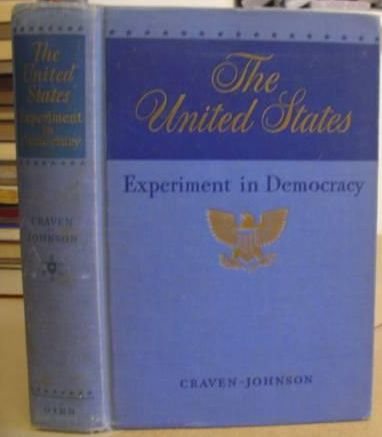
--------------------------------
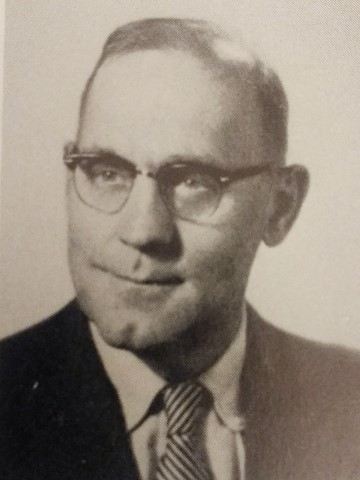 Wesley Gronewald, Math teacher.
Wesley Gronewald, Math teacher.
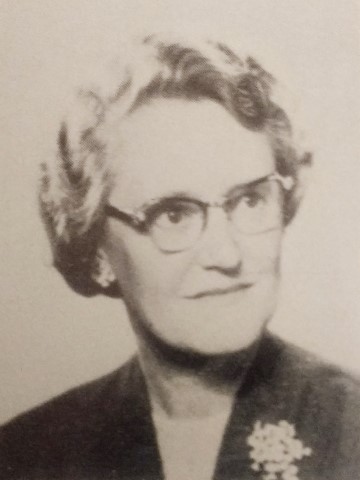 Gladys Kronsagen, English teacher.
Gladys Kronsagen, English teacher.
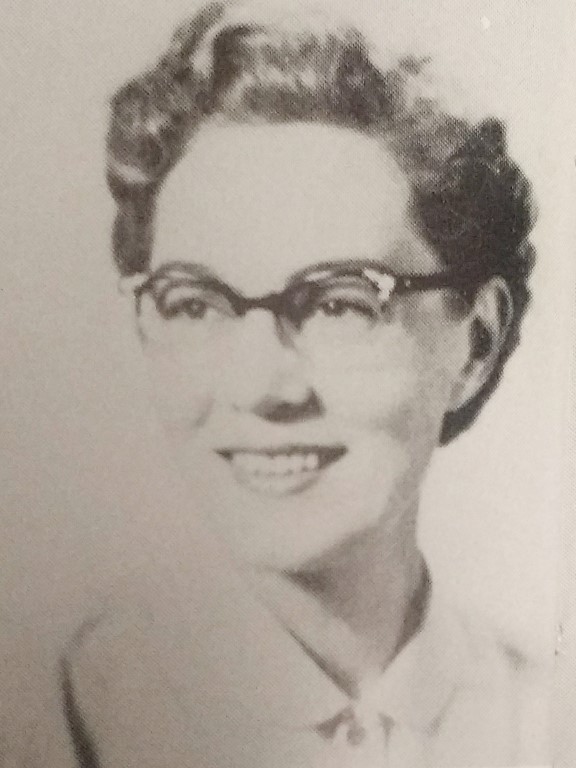 Caecilie Pieper, English teacher. In many ways the quintessential high school English teacher. We read Silas Marner and enjoyed Great Expectations, not knowing it
had been made into a wonderful British movie in 1946.
Caecilie Pieper, English teacher. In many ways the quintessential high school English teacher. We read Silas Marner and enjoyed Great Expectations, not knowing it
had been made into a wonderful British movie in 1946.
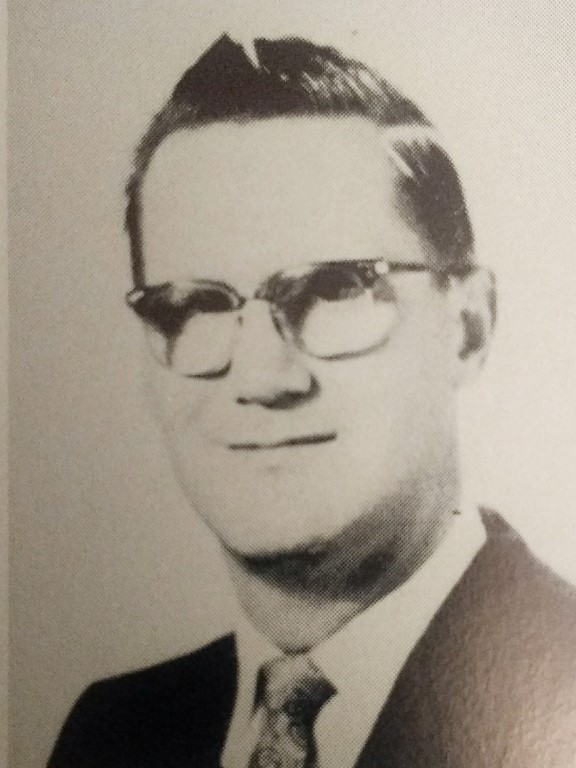 Don Porter, Who taught you how to drive.
Don Porter, Who taught you how to drive.
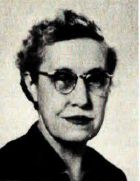
Harriet Boonstra, Home Ec teacher.
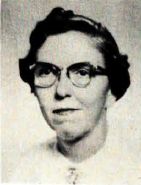
Margaret Bronson, Math teacher.

Eugene DeClark, Math teacher. Debbie Drew distinctly remembers sitting in his class. Debbie has a good math story: ". . . the really good math students were invited to learn calculus.
I was never in this group. However, when I got to the U of Michigan I thought I was hot stuff. I was placed in Honors Calculus. What a mistake. I had no clue what was going on. Did I fail?
Well, not exactly. The teacher gave me a C if I promised not to continue!!! I can laugh about it now, but at the time I was in a panic. I didn’t take calculus again until my senior year and
then I did fine in a regular (non-math geek) class."
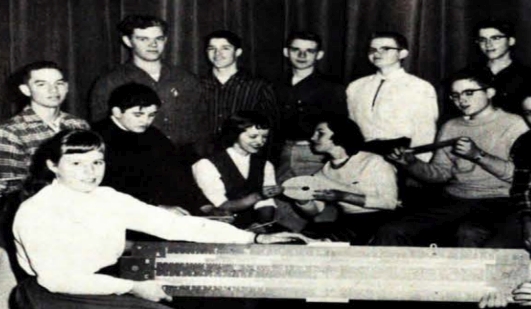

Our grammar. Copy of Becky (and Connie Malm).




